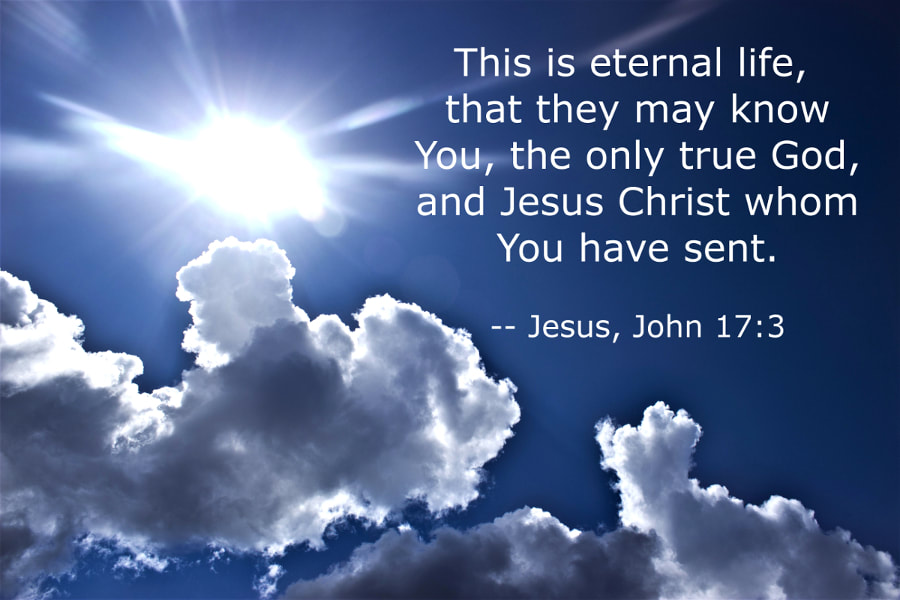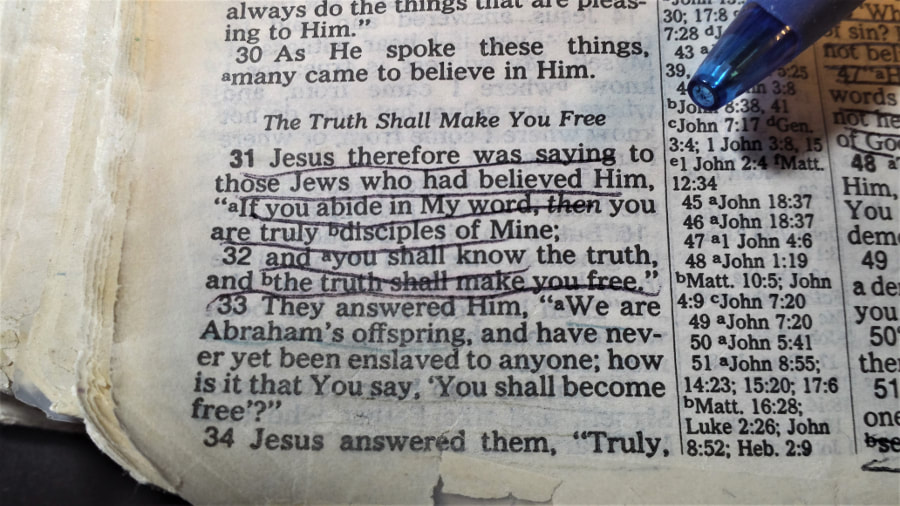"This is eternal life, that they may know You, the only true God, and Jesus Christ whom You have sent." (John 17:3)
"Life eternal, then, is not mere conscious and unending existence, but a life of acquaintance with God in Christ." (Jamieson-Fausset-Brown Bible Commentary, Ref. 1)
This lesson describes the biblical definition of eternal life. This lesson primarily uses the Scriptures about eternal life in the Gospel of John. In the next lesson in the series, we will focus on who receives eternal life and how to receive eternal life.
Consider. Think for a moment. How would you define eternal life? How would you explain eternal life to an inquisitive unbeliever, or to a new Christian? For believers in Christ, eternal life certainly includes living with God after our physical death (John 11:25-26). However, the Bible has much more to say about the characteristics of eternal life.
Eternal life is a free gift of God to believers in Jesus Christ.
The Apostle Paul states, "For the wages of sin is death, but the free gift of God is eternal life in Christ Jesus our Lord" (Romans 6:23). In this verse, the Greek word for gift is charisma. Charisma means a gift of grace, an undeserved favor (Ref. 2). Thus, eternal life is not something we deserve or earn. Eternal life is an undeserved gift of God's grace and favor. "In spite of your sanctification as Christians, still you will not have earned eternal life; it is the gift of God’s grace" (Ref. 3).
Jesus said, "My sheep hear My voice, and I know them, and they follow Me; and I give eternal life to them, and they will never perish; and no one will snatch them out of My hand" (John 10:27-28). For the believer, eternal life begins in the present, the here and now.
Jesus described eternal life in the present tense. Thus, eternal life is not just in the future, but is a present possession of the believer which continues into the future.
John 3:36 - "He who believes in the Son has eternal life; but he who does not obey the Son will not see life, but the wrath of God abides on him." John 5:24 - "Truly, truly, I say to you, he who hears My word, and believes Him who sent Me, has eternal life, and does not come into judgment, but has passed out of death into life. John 6:47 - "Truly, truly, I say to you, he who believes has eternal life." In John 5:24, note the importance of hearing Jesus' words. Jesus said, "He who hears My word, and believes Him who sent Me, has eternal life." For believers in Christ, eternal life continues with God after our physical death.
Jesus said to Martha, "I am the resurrection and the life; he who believes in Me will live even if he dies, and everyone who lives and believes in Me will never die. Do you believe this?" (John 11:25-26).
To the thief on the cross who asked Jesus to remember him, Jesus said, "Truly I say to you, today you shall be with Me in Paradise" (Luke 23:42-43). Jesus said to his disciples, "In My Father’s house are many dwelling places; if it were not so, I would have told you; for I go to prepare a place for you. If I go and prepare a place for you, I will come again and receive you to Myself, that where I am, there you may be also" (John 14:2-3). Jesus defined eternal life as knowing God experientially.
"Jesus spoke these things; and lifting up His eyes to heaven, He said, 'Father, the hour has come; glorify Your Son, that the Son may glorify You, even as You gave Him authority over all flesh, that to all whom You have given Him, He may give eternal life. This is eternal life, that they may know You, the only true God, and Jesus Christ whom You have sent" (John 17:1-3).
In John 17:3, the Greek word for know is ginóskó. Ginóskó means to know, especially through personal experience (first-hand acquaintance) (HELPS Word-studies, Ref. 4). Knowing God experientially requires knowing Jesus who is the truth (John 14:6), as well as knowing and living the Word of God on a daily and life-long basis. "This life eternal, then, is not mere conscious and unending existence, but a life of acquaintance with God in Christ" (Ref. 1). Eternal life is a quality of life, not just the duration of life.
The Greek word for eternal is aiónios, which means perpetual, unending, age-long (Strong's Concordance, Ref. 5). Aiónios includes the character of that which lasts for an age, as contrasted with that which is brief and fleeting (Ref. 5). "Aiónios does not focus on the future per se, but rather on the quality of the age it relates to. Thus, believers live in eternal life right now, experiencing this quality of God's life now as a present possession" (Helps Word-studies, Ref. 5).
Summary. Eternal life is a free gift of God to those who believe in Jesus Christ. Eternal life begins when we put our faith in Jesus. As believers in Christ, eternal life continues with God after our physical death. Eternal life is the quality of life that results when we know Jesus Christ by experience, on a first-hand basis.
Apply. Think for a moment. In your own words, how would you describe eternal life? Write down your description of eternal life in a few sentences. What Scripture verse would be your key reference?
Related Lessons
"Paradise, Jesus, and the Penitent Thief" (Luke 23:42-43) "What is the Tree of Life in the Bible?" (Genesis 2:9, Revelation 2:7) "Made Alive Together with Christ - A New Quality of Life" (Ephesians 2:4-5) "Jesus is the Resurrection and the Life (Job's Question, Jesus' Answer)" (Job 14:14, John 11:25-26)
24 Comments
"Then Jesus said to those Jews who believed Him, 'If you abide in My word, you are My disciples indeed. And you shall know the truth, and the truth shall make you free.' " (John 8:31-32)
This lesson is the third in the series, "About the Truth." The first lesson was "God's Truth in the Old Testament" where we learned that God's Word in its entirety is truth (Psalm 119:160). The second lesson was "Jesus is the Truth" based on John 14:6. This lesson discusses Jesus' instructions to believers to abide in the Word and to know the truth experientially.
Consider.
To whom was Jesus speaking?
When Jesus spoke the promise, "You shall know the truth, and the truth shall make you free," Jesus was speaking to people who believed him. That is, Jesus was speaking to people who had faith in him and who trusted him. The beginning of John 8:31 states, "So Jesus was saying to those Jews who had believed Him ..."
Believe in Jesus.
Jesus does not ask us to believe a truth, or any truth (Ref. 1). Jesus asks us to believe that He is the truth (John 14:6). If you have never put your trust in Jesus, or if you have strayed away from Jesus, put your trust in him today. Believing in Jesus who is the Truth will set you free from slavery to sin, and will give you eternal life.
"Therefore there is now no condemnation for those who are in Christ Jesus. For the law of the Spirit of life in Christ Jesus has set you free from the law of sin and of death" (Romans 8:1-2). "For God so loved the world, that He gave His only begotten Son, that whoever believes in Him shall not perish, but have eternal life" (John 3:16). Abide in the Word and know the truth experientially.
Jesus says to believers in the second portion of John 8:31 and in verse 32, "If you abide in My word, you are My disciples indeed. And you shall know the truth, and the truth shall make you free." The Greek word for abide is menó which means remain, abide (Ref. 2). As believers in Christ, we are to abide in the Word, and persevere in studying, learning, and applying God's Word.
Jesus says that if we abide in the Word we will know the truth experientially (John 8:31-32). The Greek word for know is ginóskó which means to know, especially through personal experience (first-hand acquaintance) (Ref. 3). Knowing the truth experientially requires knowing Jesus who is the truth, as well as knowing and living the Word of God on a daily and life-long basis.
Jesus says that if we abide in the Word we will know the truth and the truth will make us free (John 8:31-32). The Greek verb make free is eleutheroó which means liberate, set free, release from bondage (Ref. 4). When we trust Jesus as our Lord and Savior, abide in his Word, and grow in knowledge of his truth, we are set free from slavery to sin. Jesus says, "Truly, truly, I say to you, everyone who commits sin is the slave of sin" (John 8:34). "So if the Son makes you free, you will be free indeed" (John 8:36).
Billy Graham Quote
I will end this post with a quote from Billy Graham's message, "What is Truth?" (Ref. 1)
"Turn to Christ—to the truth. Jesus said, 'You shall know the truth, and the truth shall make you free' (John 8:32). He said, 'I am … the truth' (John 14:6). Jesus did not say, 'You shall know a truth' or 'any truth' but 'the truth.' He’s the embodiment of all truth. Jesus said, 'If you do not believe that I am He, you will die in your sins' (John 8:24). If you don’t believe that and don’t accept Christ, you will die in your sins and you’ll be lost. Jesus Christ claimed to be ultimate truth. Are you willing to face the truth?" (Ref. 1)
Apply. Are you willing to face the ultimate truth of Jesus Christ? Will you put your faith and trust in him? What steps will you take to abide in God's Word and to grow in your knowledge of the truth?
Related Lessons
"God's Truth in the Old Testament" (Psalm 119:160) "Jesus is the Truth" (John 14:6) "The Spirit of Truth" (John 16:13-14) "Jesus - Witness to the Truth" (John 18:37)
References
1. https://billygraham.org/decision-magazine/march-2017/classic-message-billy-graham-truth/ ©1985 Billy Graham Evangelistic Association. Used with permission. All rights reserved. 2. https://biblehub.com/greek/3306.htm 3. https://biblehub.com/greek/1097.htm 4. https://biblehub.com/greek/1659.htm |
Daily Bible Verse(Click the link above) AuthorMr. Whitney V. Myers. Christian. For more information, please visit the Author Page. Posting ScheduleI plan to provide new postings about once a month. Planned Topics(subject to change) Recent Posts(most recent three months) Popular Posts(top 10) Categories
All
Archives
July 2024
|
|
Copyright 2018-2024 Whitney V. Myers |
Listed in Feedspot's Top 100 Bible Study Blogs and Websites |


 RSS Feed
RSS Feed
